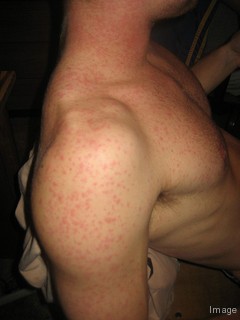If you have noticed small red dots on the skin and body, you may be feeling very concerned. These types of dots are actually quite common and have several other names including petechiae, ecchymosis, pinpoint red spots or simply skin spots. They are caused by slight bleeding under the level of the skin. Usually, they are quite tiny; although, sometimes the bleeding can spread into a larger bruise. What causes these spots, is it signs of skin cancer and what can be done about them? Read on to find out.
The reasons for red spots on the skin are many and varied and may include the use of anti-coagulant or anti-platelet drugs, the use of steroids, age, dermatitis, chemotherapy, viral or bacterial infections, disorders of the autoimmune system, skin cancer, leukemia disease and other serious illnesses, allergies or simple bruising. Additionally, newborn babies often exhibit this condition due to the trauma of birth. Because there are so many different causes, it is important to see your doctor if your red spots on skin do not have an obvious cause, such as bruising.
It is important to note that skin redness, such as sunburn or rashes are not the same thing as bleeding under the skin and should not be treated in the same way. To tell the difference, try pressing gently on the area with your finger. If the redness disappears momentarily, it is on the surface of the skin. This is not bleeding under the skin.

.
There are a number of things you can do at home to treat red dots on skin. For bruising, an ice pack may be helpful. If your condition is caused by allergies, allergy treatment as recommended by your doctor should resolve your symptoms. If your red spots are a sign of aging, increasing your skin care and maintenance regimen, avoiding injury and staying well hydrated should help. Red raspberry seed oil supplement can be used for this purpose and to prevent dry skin rashes & irritation.
If your skin condition is caused by use of prescription or non-prescription drugs, an illness or condition or if you simply do not know why you have small red dots on the skin, you must see your doctor right away. Additionally, if you get a bruise that simply does not diminish with time, you should contact your doctor. These dots can be unimportant, or they can present an important clue to more serious conditions.
When you visit your doctor about tiny red dots on skin, he or she will perform a complete medical history and examination of your health. You should be prepared to tell your doctor whether you have suffered a recent injury or are taking any prescription or non-prescription medications or supplements. Some to keep in mind are blood thinners, which can include Warfarin, Coumadin and even aspirin. Try to keep track of any patterns in the symptoms. For example, if they tend to worsen as the day progresses, your doctor needs to know about it. Try to remember if the symptoms began following an event such as a tooth extraction. Overall, be prepared to tell your doctor everything you have noticed about your condition.
Based on your interview and your examination results, your doctor may be able to help you treat your dots on skin right away. Alternately, he or she may order any number of tests to determine the cause of your condition. These could include a complete blood work series and possibly a bone marrow biopsy. Remember that lab work testing is often done to rule out causes of a symptom, so you should not be fearful if your doctor sends you on your way with a handful of lab work slips. The results of your medical tests will help you determine the cause of your tiny red dots on skin.
For more information about this health conditions please watch this related video.

Is here some home remedies for red spots on skin?